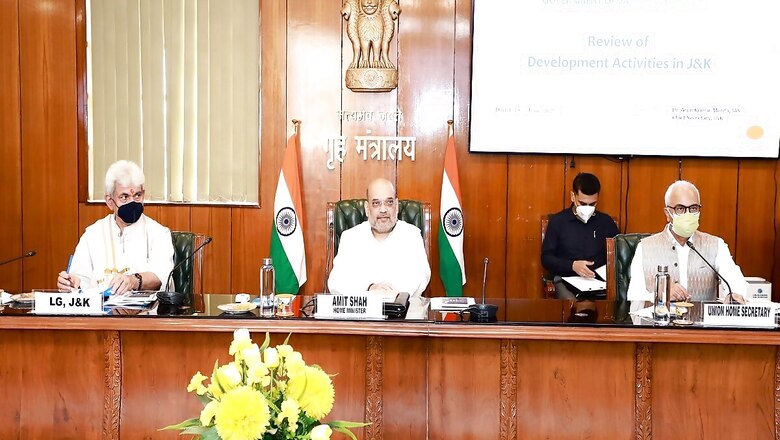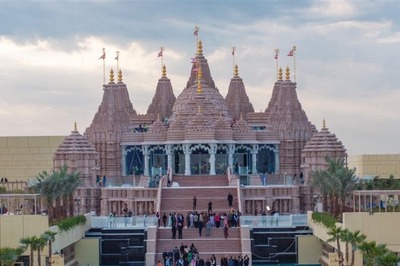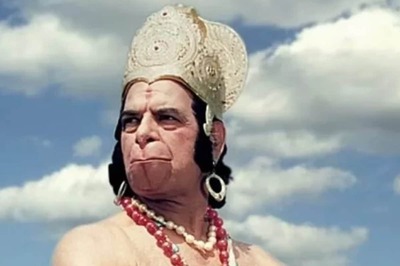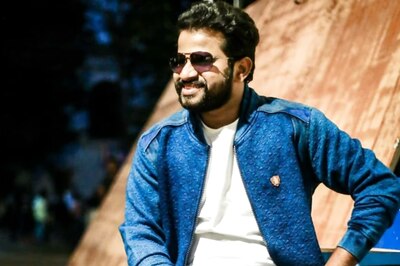
views
Reports suggesting that New Delhi is all set to discuss the restoration of statehood to the Union Territory of Jammu and Kashmir with political stakeholders from the region are not really surprising. Home Minister Amit Shah had made a commitment that statehood would be restored as soon as the government of India felt the conditions were conducive for it. The timing of the move does, however, raise some questions.
This is not so much because the situation in the Union Territory (UT) has not shown dramatic improvement. If anything, even the most ardent supporter of the constitutional reforms carried out in the erstwhile state on August 5, 2019 is pleasantly surprised by how quickly things have turned around in the newly formed UT. The question some people will ask about the timing of New Delhi’s purported move is whether it is aimed at invigorating the political process in J&K, or it is aimed at keeping the ball in play in the back-channel talks that are being held with Pakistan.
Rules of the Game Have Changed
Inside J&K, the Centre’s move offers a face-saver to the political parties to jump back into the political fray. If they fail to grab this opportunity, the alternative is political marginalisation because the political process will continue to move ahead regardless of who opts out. Of course, after August 5, the rules of the political game have changed, and the politicians in J&K need to adjust to the new realities. This means that they can no longer use the old playbook in which they became staunch nationalists when they were in power and flirted with soft-separatism when they lost power. More importantly, they will have to reconcile to the sweeping amendments made in Article 370—the Article hasn’t been abrogated because it remains a part of the Constitution. This means that there is also no going back to Article 35A which had been inserted in the Constitution surreptitiously.
ALSO READ | Modi Govt’s Decision to Restore Statehood to J&K Could Offer its People Much-needed Release
The new domicile laws in J&K, which are virtually the same as in every other state of the Indian Union and impose many restrictions on acquiring domicile of J&K, are also unlikely to be reversed. The statehood in any case will not be restored overnight. It will require an act of Parliament and cannot be done through an executive order. Also, it isn’t yet clear if statehood will precede or follow the delimitation exercise, which by some accounts will take months if not a year or more. There is some speculation on whether or not full statehood will be restored or it will be truncated statehood in which the Centre will retain some of the powers, especially those pertaining to law and order, security and perhaps even some control over the bureaucracy.
Conflicting Signals from Pakistan
Regardless of whether or not the roadmap that will be discussed in the meeting called by Prime Minister Narendra Modi on June 24 with political leaders from J&K has anything to do with the back-channel talks with Pakistan, it will unfortunately tend to get conflated with it. The question is will the roadmap that is unveiled be enough to keep the back-channel on track.
Conflicting signals have been emerging from Pakistan where the ‘selected’ Prime Minister Imran Khan is playing bad-cop, to his ‘selector’ General Qamar Bajwa’s good-cop. The military establishment in Pakistan is quite okay with the amendments in Article 370 not being reversed. But they have been wanting Article 35A restored so that there is no demographic change in J&K. The Pakistan Army has reportedly conveyed that restoration of statehood will be seen as a positive sign. For his part, Imran Khan has made so many U-turns on his position on Kashmir that it is difficult to figure where exactly he stands. His latest stand came in an interview to Reuters where he said that if India even presented a roadmap of how she will restore the pre-August 5 status of J&K, it will be enough to start a dialogue.
The thing is that unless Prime Minister Narendra Modi is hell bent on committing political suicide, there is no going back to status quo ante. This means Articles 370 and 35A, and reversing the domicile laws are off the table. The wish-list of the generals also included no further changes in the political geography of the UT. That is clearly not on the agenda of New Delhi so that should give some comfort to the Khakis in Rawalpindi.
ALSO READ | Plans of Restoring Statehood or Assembly Poll Prep? Reading into Agenda of PM Modi’s Meeting with J&K Leaders
As for restoring normalcy in lives of people, unless the Pakistani generals are getting taken in by their own fake news and lurid propaganda, they would know that Kashmir is today more normal than it has been for many years now. Of course, there will continue to be the odd guy who will be seduced by the romanticism of picking the gun; there will also be incidents of small-time terrorist violence and counter-terror operations by security forces. But otherwise, Kashmir today seems to have turned the corner.
The Problem of Messaging
It remains to be seen if the generals in Rawalpindi use the statehood restoration as a face-saver to keep the back-channel going, or they take a maximalist stand and lose the opportunity that is offering itself to them. Already, some of the drumbeaters of the military establishment in the Pakistani media are crowing about how Modi has buckled under and given in to Pakistan’s demands. Others in Pakistani media have said that there is very good news coming for the Kashmiris. In other words, if the generals, who make and control both policy and narrative on India, want to spin the move being made my Prime Minister Modi in Kashmir in favour of continuing their contacts with people in the Indian establishment, they can do so.
The problem is more on the Indian side, especially in terms of messaging. The conflation of any political move in J&K with normalising relations with Pakistan is really something of a political and strategic disaster. To let such an impression get traction is to turn the clock back and undo the impact of the game-changing constitutional reforms in J&K. Perceptually, it is tantamount to conceding that the Pakistanis have a veto on anything India does in its own sovereign territory, a place that India insists is her integral part.
It is imperative that New Delhi does everything possible to disabuse everyone that its outreach in Jammu and Srinagar is with an eye on Rawalpindi. If this is not done, it will not only embolden the Pakistanis and separatists to continue doing what they were doing, it will also encourage the political class in J&K to revert to their old playbook of playing on both sides of the wicket. If this ends up being the outcome of New Delhi’s latest political initiative, then what was the point of the constitutional reforms undertaken in August 2019?
Read all the Latest News, Breaking News and Coronavirus News here.




















Comments
0 comment